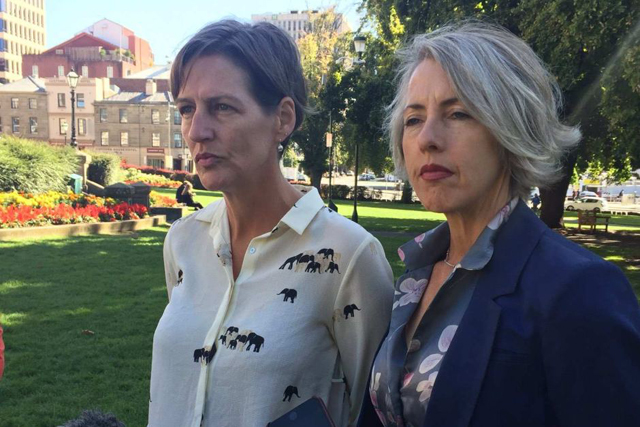Public support for the Greens seems to be slipping, yet their message is more important than ever.

Cassy O’Connor and Rosalie Woodruff face a diminished presence in the Tasmanian parliament. PHOTO ABC News
State polls in Tasmania and South Australia and a federal by-election in Melbourne this month are food for thought for the Greens – and for the rest of us.
On the face of it, the party is on the slide. In Tasmania its vote was well down and it lost a seat, its primary vote declined in South Australia, and it lost the Batman by-election which it had been favoured to win.
That would be evidence of a party on the way out, except that just four months ago the Greens scored a memorable win in a state by-election in Victoria, ousting Labor from a seat it had held for 90 years.
This is politics in the 21st century – volatile and unpredictable, with today’s darlings quickly becoming tomorrow’s pariahs. Richard Di Natale and Cassy O’Connor are well aware that being a party leader is a roller-coaster ride.
With minor personality-based parties seemingly on the nose, the two main parties, well-known for their disdain of minor players on the political stage, seem to be back in favour.
The Nationals, stolid country cousins of the Liberals, have endured on the conservative side of politics by remaining in lock-step with the larger party on all crucial votes. No such alliance has been possible between the Greens and Labor as each party fiercely defends its independence.
The Greens’ core constituency has always been teenagers and twenty-somethings focused heavily on matters environmental – mostly protection of natural values like waterways and forests; more recently on the broader issue of climate change.
But as this party of youth approaches its 40th birthday, like all progressive parties it faces the challenge of remaining an effective political force while keeping the ideas flowing and continuing to engage the young minds that will always be its lifeblood.
When the Greens started up in Tasmania in the early 1980s, the party attracted people who were through with the bigger parties and their love affair with power elites, notably the state-owned Hydro Electric Commission, bent on damming the lower Gordon River.
The Greens’ success in that memorable conflict turbo-charged them for the battle over native forest logging that dominated the state’s politics for over a quarter of a century, ending only with the 2012 forest agreement and the 2013 collapse of Gunns Limited.
Battling the status quo became the Greens’ trademark in partnerships with major parties on both sides of the political divide, all of which produced some significant and lasting reforms. But the alliances tended to be fraught and tenuous, never lasting more than one term.
The idea that a coalition with the Greens always ends in tears is now a central theme in Tasmanian politics and, since the 2010 Labor-Green pact supporting a Gillard government, in the federal sphere too.
Some governments seem less tumultuous than others, but in truth all politics is fraught because power and paranoia go hand in hand. The argument for majority government is no more than a self-serving device to keep independent thinkers out of parliament. Do we really want that?
Independent thinking is what Greens do best. Their enemies in the major parties, to conceal their own conformity, call them mindless ideologues, but the Greens bring a breath of fresh air into the public debate, contributing ideas and insights far above their numbers.
They led the defence of natural values in our wild places. They were first to advocate a “clean, green” agenda – since adopted by major parties wanting credit for tourism success. And they have led debate on a raft of social reforms, including legalising homosexual relationships.
It took a while for the Greens to hit their straps when climate change first entered the public debate. Voting down Kevin Rudd’s emissions reduction plan in 2010 was an early misstep, but later that year they played a key part in formulating our one and only national pricing scheme.
Wilful ignorance ended that scheme in 2014. It also led to the trashing of an outstanding Tasmanian climate strategy released by O’Connor as climate change minister in 2013. Its grossly inferior successor was never more than a climate change box for the government to tick before moving on.
Even today our political and bureaucratic leaders are missing the fundamental truth that climate change will increasingly influence our economies, our institutions, our governance and our whole existence as communities and nations, and if left unattended will overwhelm them all.
The Greens know this better than anyone. Take them out of our parliaments and you remove a vital cog in public understanding of where things are headed in this fast-moving century. We need their voice, and we abandon them at our cost.
